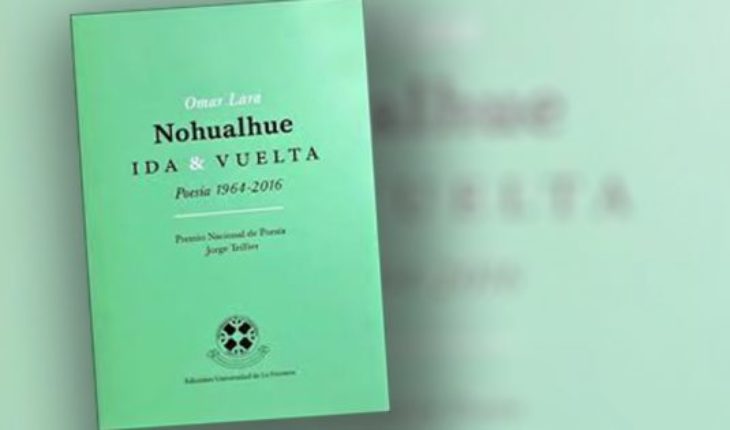the company meet cincuen Ta years of poetic production reflects a publishing bet that pays tribute to one of the authors of the generation of the sixties that it deserves to be among the greats of the current Chilean poetry, who was deserving of the national prize of poetry Jorge Teillier which gives the University of la Frontera. A poetry that provides us with multiple aspects, perspectives and experiences of memory related to the love, to the political and existential, joint in the volume “Ida Nohualhue & back. Poetry 1964 – 2016 “Omar Lara.
Since his first book “Argument of the day” (father publishing houses, Temuco, 1964) already glimpse one of the predominant themes in the work of Lara which is memory, human and literary dimension which takes multiple forms relate to the field of loving love, as when he says that: “in my town / moonless / where love blooms / grope / occasionally lyrical / sensitive / sleepwalker / usually me happens / do you remember“. Next to the memory, therefore the question, score, knowing and expressing that it does not know gives way to the poet to investigate through the creation: “because after all / what is worth more / doesn’t matter so much, / sentences / as from here to death. / because after to” do, / because before, / because over and the / side of things, / because in the end / are not more than preguntando.// not are more than asking“.” That same year the author publishes “buenos dias and other poems” (Trilce Ediciones, Valdivia, 1964) where combines another aspect of memory related to moments of childhood and the village, which evidence its proximity to teillierana in verses such as political philosophy: “]I was running on the grass / between Imperial daisies“, book that also abound in poems that make reference to the body and metaphysics:”there are / especially / stupor from nothing after the pores / your body“, to the mue” RTE and suicide, the son and other dimensions that the poet would work throughout all his work as it is both physical and spiritual landscape: “there is still that place, is changed / but there’s“.
In the book “Oh good manners” (Publishing House of the Americas, Havana, 1975) you can feel the already not latent but that real threat of dictatorship, where shown and the city as entities and contexts devastated, decadent, as in the poem “I can not live and” n ignorance”:”be prohibited to shelter in his house / greet him, traveling on the same bus“, where people, by ideology, carry a new form of leprosy this symbolic time. Later, in the same book, refers to a critical aspect of memory: “wise man exhibits a thrilling / inclination / to perfect balance. / in complicity with weak memory” and it is thus that the memory, poor memory is the dis Fraz false spirit and good manners that acts: “here is a miserable should tell you miserable / should spit it / smiled however“, expression that exposes the cynicism of an entire society that prefers the deception and lies in the ve shattering, more staff that is. Another very interesting aspect of this book is the complex that forms the meeting on a same poem by elements related to poetry larica, memory, and the reference to the source: “out of a memorable trip to Valparaiso / my grandparents did not have another sky than the” from / Nohualhue, / not set foot in another of the garden soil / victorious / and the dusty streets of Imperial“poem ‘These sky’ written in Lima, poem and book in which begins a strongly letter writing, promoting the message that their writing” It is a writing of the exile, as well as we can also read poems addressed to the dictator as “Point to a general portrait”: “a lean, uncivil, uncouth brain / walk / poems hanging you like lint sebosas, / drool dripping off him confused with” blood“.”
In the book “Chronicles from el Reyno de Chile” (Buletinul Publishing House, Bucharest, 1976) the poet begins with a harrowing poem that makes a game of high-contrast whose drama intensifies to superimpose images of torture and death along with scenes of love and joy framed both in a season that stands out for being life-giving: “come from the spring of Chile. / through the prison gates / the magnificent Green looks / (…)” “I saw several of my friends / in the soft Sun of November / and saw them for the last time. / killed them at the dawn / when the furtive lover / goodbye among the cherry trees”. In this book, as a reader, one is truly horrified, emaciated to the cruelty of the exercise of the dictatorship in the mind, spirit and body of the same poet and fellow of route and lyrics, as in the poem “sometimes I write a letter” in which dedication It can be read: “to the memory of Héctor Valenzuela, killed together in October 1973, Hilda and her spouse, Claudia, of 6 years, daughter“, where he writes “sometimes I write a letter / and it occurs to me to ask / where should I go it”“.” Many of these poems, needless to say it, they are written while he was detained in the prison of Valdivia. On “Floating islands” (Editorial Cartea Romaneasca, Bucharest, 1980), one of the most important issues is the brutality of the dictatorship against the world of literature: “has not read in the city, / books burned in great piles / and before all” written letter / residents down the view / full of confusion and shame“, book that maintains the letter form in a negative way:”in my p.o. box grows Moss“.”
Already entered the 21st century the poet gives us a book that displays all their amplitude poetic in one of his best-known titles: “Voices of black” (Editorial Universidad de Concepción, Concepción, 2003), which exposes the themes that stand out most in the poetic lariana: “history stood at the door / cities of misery / mouths burned by the silence / bodies besieged in a vacuum / dust of bones in the air. / / is cold in black / a cold Saturday only / desperate youth / dance alone and desperate / a” music desperate. / it’s cold in black / (…) Those things are very strange / that sometimes take by certain / and there are abhorrent truths / the well of memory“.” Poem of desolation, of despair in which memory torture porta, which is assumed as a salesman whom we all already know crosses spaces, times and landscapes, from the dictatorship, against their will as it says in the poem “Diario de Viaje” : “I lived in a boat / indeed / still there / to always“. But one of the things that stands out most in this book is his streak teillierana, where the poet writes that “poetry for what can / serve but to be?”, book that concentrates his poetic work around memory in verses such as: “then, to where to look / but the memory biting bird / who writes blood / and drown in the blood. And drown“.”
Later, in the book “The new frontier” (Editorial Universidad de Concepción, Concepción, 2007), whose title shows us the possibility of a further, perhaps unexplored, also shows us the memory in another aspect: “something to breathe / I am without” “mask / and swim in memory /(la memoria de quién/ de quién de los que fui) / (…) say that nothing serves / what can I say I / but all so circle / and it’s all so wound”, because the eternal return and the pain made flesh who is attentive to the signs of the universe which is They tattooed on the skin of those who live the cosmos in their scriptural pilgrimage, but the memory returns in “I lived quiet” and other poems: “I lived quiet in my sacred Lair / and came the memory with his evil laugh / fierce and malicious memory / with your legs def” “ormes and his hair worm / dragging his book of duties and assets”. A history of horror, but that in any way gives us the beauty that, by terrible to be, is a gift of life that can sing.
Nohualhue, birthplace of the poet who projected it to many other places and returns to which to collect his work and gather around the tenderness of a song that takes multiple forms, is a sign of dignity and fortitude against the ravages of a despicable human reality, but that keeps the love in front of his own, which are also those who can read his poetry.
Omar Lara, Nohualhue round & round. Poetry 1964-2016, Editorial Universidad de la Frontera, Temuco, 2017, 540 pages.
Ramiro Villarroel Cifuentes. Writer
The content poured into this op-ed is the sole responsibility of its author, and does not reflect necesariame NTE the editorial line nor the counter position.





